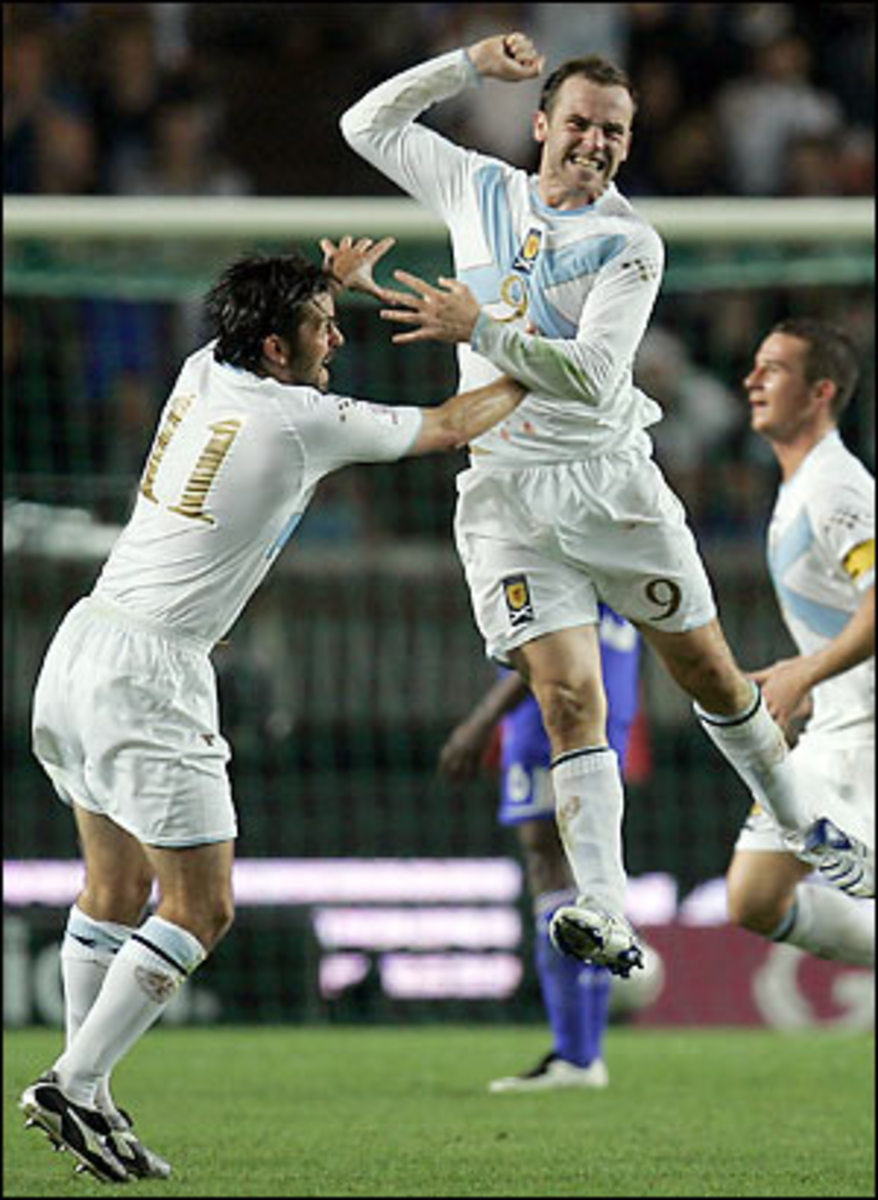Sick men of Europe
We're still a month away from the completion of the qualifiers for next year's European Championship finals and we only know six of the 16 finalists. But it's already clear that the tournament will feature the usual suspects -- with the likely exception of dear old England.
For UEFA, the seedings of the qualifying groups have worked a treat. Apart from England, which was outwitted by Guus Hiddink's Russia in Moscow last week, and Norway, which should edge out Turkey, the top two seeds in each of the seven qualifying groups are likely to travel to Austria and Switzerland next June.
The change in qualifying format -- the top two in each group now qualify automatically, rather than group winners qualifying automatically and runners-up playing off against other -- has helped the big guns, and squeezed out the smaller nations. There will be no Latvia (the surprise qualifier in '04) or Slovenia (the shock inclusion in '00) at Euro '08.
The biggest shock has been provided by England, which needs a minor miracle if it is to avoid failure to qualify for a major tournament for first time since 1994. Its destiny is out of its hands, though the conspiracy theories that have emerged -- suggesting Israel will go easy on Russia in Tel Aviv in a game that England needs the Israelis to win -- are surely wide of the mark.
With the exception of Germany, all the major nations have struggled at some point during the qualifying campaign -- and even Germany capitulated to the Czech Republic in Munich last week, losing 3-0 in its first game since securing qualification.
Italy and France, last year's World Cup finalists, played out a tepid draw in Milan last month, and both have dropped points against key opponents in their group, with the French losing home and away to Scotland and Italy being held at home by Lithuania. Spain, meanwhile, suffered a humiliating defeat to Northern Ireland early on in the campaign.
But unlike England, all of the above countries have taken maximum points from all of their other games. Steve McClaren's English side, in contrast, lost in Croatia and Russia, failed to beat Macedonia at home and could only draw with Israel in Tel Aviv.
Aside from England, the qualifying campaigns that will be deemed "failures" have been those of middle-ranking countries such as Belgium, Denmark and Turkey. The sorry state of Belgian soccer has been reflected by a campaign that is likely to see Belgium finish fifth, behind Poland, Portugal, Serbia and Finland.
Denmark, meanwhile, has not recovered from abandonment of its home game against Sweden in June, when the Swedes were awarded all the points when the game in Copenhagen was abandoned after a Danish fan ran onto the pitch and attacked Christian Poulsen, who had been sent off for his part in the awarding of a penalty to Sweden, with the scores at 3-3.
Richard Moller Nielsen, the coach behind the Danish side that won European Championship in '92 in such extraordinary circumstances, likes to compare international soccer to an ocean. The big nations, led by Germany and Italy, have wave after wave of talented players.
But for middle-ranking nations such as Denmark, such a wave only comes along once in a generation. The Danes had such a squad in '92, while Bulgaria with Hristo Stoichkov, Romania with Gheorghe Hagi and Croatia with Zvonimir Boban, were similarly successful in the late 1990s.
This century, it has been harder to find national sides that conform to Nielsen's theory. Ukraine, led by Andriy Shevchenko, is the most obvious example. But Greece, the surprise winner of Euro '04, had precious few star names. Furthermore, the pragmatic nature of its soccer didn't lend itself to the fairy-tale headlines that accompanied the Danes at Euro '92.
From the Euro '08 qualifiers, it has been hard to identify any teams who might rise above their previous performances and enjoy a moment in the sun next summer. Scotland is enjoying a remarkable renaissance under Alex McLeish, who is carrying on the good work of Walter Smith after the disastrous reign of Berti Vogts.
The Scots could make it to next summer's finals, where the likes of JamesMcFadden and Scott Brown would not look out of place. But beating a team of the caliber of Italy, as Scotland must next month at Hampden Park, will be a tall order.
The Tartan Army, as Scotland's traveling fans are called, are always a welcome addition to any tournament. Their last appearance at a major final -- the '98 World Cup in France -- was memorable for their good-natured behavior, in stark contrast to the small band of England fans that smashed up a waterfront in Marseille.
Sadly for England, its fans are unlikely to get a chance to redeem themselves next summer.
Gavin Hamilton is the editor in chief ofWorld SoccerMagazine. He contributes to SI.com on alternate Mondays.






